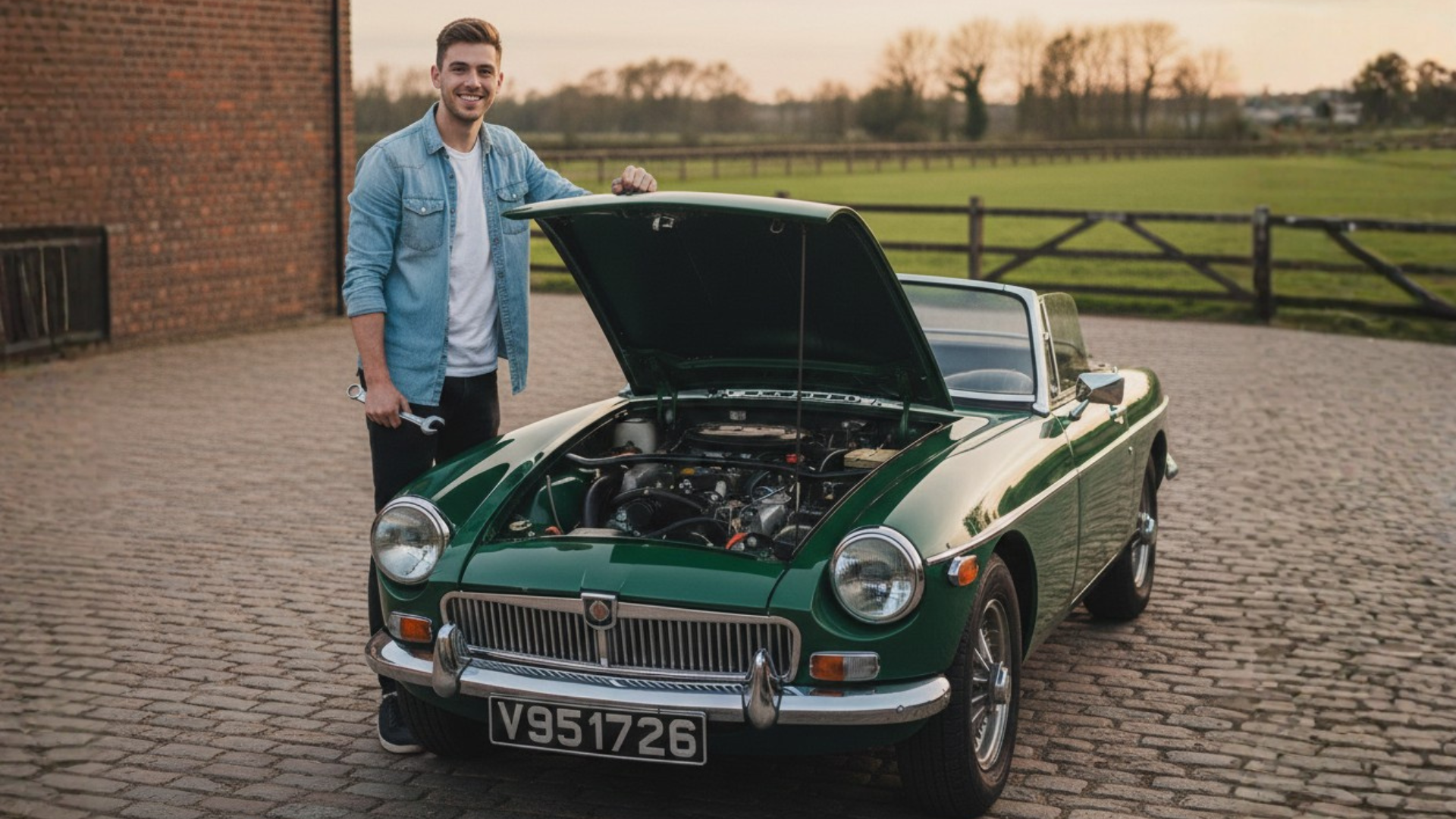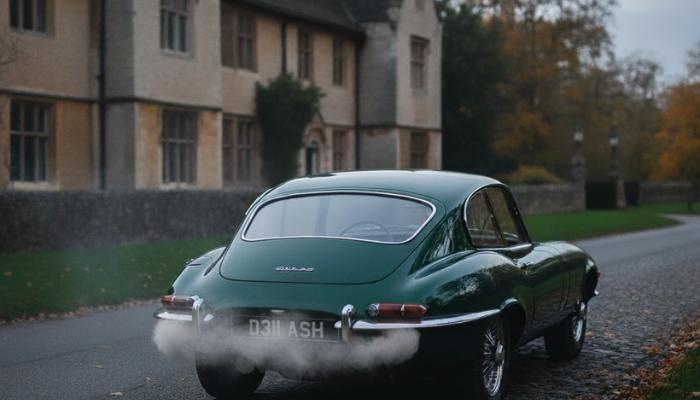When it comes to driving a classic car, there’s nothing quite like the joy of hitting the open road in a piece of automotive history. But along with the charm of these vintage machines comes the occasional roadside hiccup.
Whether it’s a misfiring engine, a loose connection, or an unexpected leak, having the right toolkit on hand can mean the difference between a minor inconvenience and being stranded. In this blog, we’ll guide you through the essential toolkit for classic cars, that every owner should carry to tackle common repairs on and off the road, ensuring that your journey stays smooth and stress-free.
20 Items to Create Your Toolkit For Classic Cars:
Spanners (Wrenches)
Spanners are essential for tightening or loosening nuts and bolts, which are found all over the car, from engine components to body panels. Having both metric and imperial spanners is important, as classic cars often use imperial fasteners. A combination spanner set (with open and closed ends) will give you more flexibility for different tasks
Screwdrivers
A set of flathead and Phillips screwdrivers is a must. These are used for tightening or loosening screws on various components, such as the interior panels, carburettor, electrical components, such as a distributor cap and finally, trim pieces. Some older cars may have a mix of screw types, so having both options is crucial.
Feeler Gauges
Feeler gauges are thin metal strips used to measure the gap between two parts. In classic cars, they’re primarily used to set valve clearance (ensuring proper valve timing) and spark plug gaps. If the valves aren’t gapped correctly, your engine’s timing and efficiency will be affected, leading to performance issues or even damage. Proper valve clearance ensures that the engine “breathes” correctly, maintaining compression and power output.
Pliers (Regular and Needle-Nose)
Pliers are incredibly versatile and can be used for tasks like gripping and bending wires, holding small components, or pulling out fuses. Needle-nose pliers can help you reach tight spots in your engine bay, while regular pliers provide stronger gripping power.
Wire (Electrical Wire)
Electrical issues can be a common fault with classic cars, especially with old wiring looms that may degrade over time. Keeping spare wire (of various gauges) is useful for replacing burnt-out or corroded wiring on the fly. It’s also handy for jump-starting electrical components or repairing the car’s lighting system.
Crimping Tool
A crimping tool is essential for making solid electrical connections. When wiring burns out or becomes loose, you’ll need to cut it, strip the ends, and crimp new connectors to ensure a safe and reliable electrical connection. A good crimp can prevent electrical shorts or fires, making this a key part of your toolkit.
Electrical Tape
Electrical tape is essential for insulating and protecting wires. Whether you’re securing a temporary fix or adding extra insulation around connectors, it prevents short circuits, moisture ingress, and corrosion, all of which are common in the electrical systems of classic cars.
Socket Set (With Ratchet and Extensions)
A socket set, along with a ratchet and extension bars, will make your life easier when dealing with bolts in hard-to-reach places like deep in the engine bay. Having both metric and imperial sockets is essential, depending on the make and model of your classic car. The ratchet allows for faster tightening/loosening compared to spanners.
Oil (Engine Oil)
Classic cars are often prone to oil leaks or consumption due to older seals and gaskets. Carrying a bottle of engine oil ensures that you can top up as needed, preventing damage to the engine from running low on oil. It’s especially important on long drives where repair services might be far away.
Water (Coolant or Plain Water)
Older cars are more prone to overheating, especially if the radiator or cooling system isn’t in perfect condition. Carrying water (or better yet, a proper coolant) can help you top up the system and get the car back to a safer temperature if it overheats.
Tyre Pressure Gauge
Keeping your tyres properly inflated is important for both performance and safety. A tyre pressure gauge will help you ensure your tyres are at the correct pressure, especially if you’re experiencing issues such as steering pulling or uneven tyre wear.
Jack and Wheel Brace
A flat tyre can be a common issue on classic cars due to ageing rubber, so a jack and wheel brace (for removing lug nuts) are essential. Even if you have roadside assistance, having these tools means you can change the tyre yourself if necessary.
Spare Fuses
Classic cars often have electrical gremlins, and blown fuses are common. Keeping spare fuses of the correct rating ensures that you can replace any that go bad, helping to get your lights, radio, or wipers back up and running.
Hose Clamps and Spare Hoses
Classic cars often experience problems with hoses, especially radiator hoses that can burst under pressure. Spare hoses and hose clamps can help you fix a coolant or vacuum line failure on the road, preventing bigger engine issues like overheating.
Hammer (Preferably a Rawhide or Rubber Mallet)
A hammer (ideally a rawhide or rubber mallet) can help you knock loose stuck components, such as stubborn brake drums or wheels, without damaging them. It’s also handy for tapping in parts that require gentle force.
Multi-meter
Electrical problems are a frequent headache with older cars. A multi-meter will help you troubleshoot battery, alternator, and wiring issues by allowing you to measure voltage, resistance, and continuity. It’s an invaluable tool for diagnosing electrical problems.
Wind UpTorch (Flashlight)
Many roadside repairs, especially electrical ones, may require working in low-light conditions. A good quality torch ensures you can see what you’re doing, whether you’re under the bonnet or inside the car. By choosing a wind up torch you eliminate the need for batteries, which go flat and can leave you in a jam.
Cable Ties
Cable ties are handy for securing loose cables, wiring, or even temporarily holding parts in place. They’re strong, quick to use, and can be a lifesaver for on-the-spot fixes.
Fuel Can
Running out of fuel can be a bigger problem in classic cars due to unreliable fuel gauges. Carrying a small, empty fuel can means you can fetch fuel if needed, especially if you’re driving through remote areas.
Gasket Sealer/Instant Gasket
A small tube of gasket sealer can help temporarily fix minor leaks in the gasket areas of your engine or water pump. Classic cars often develop leaks due to ageing seals, and this can help get you home without major repairs.
Wire Brush/WD40
Last, but not least, a wire brush. This is essential for cleaning corrosion off battery terminals, electrical connections, and various metal components. Corrosion is a common issue in classic cars, especially in older electrical systems and engine parts, and cleaning these surfaces ensures good electrical contact and improves performance. It’s also useful for cleaning rust or dirt from nuts, bolts, and other metal parts during repairs. Don’t forget your WD40.
Final Thoughts
Having the right toolkit can be the difference between a minor roadside fix and a major headache with your classic car. Being prepared with these essential tools allows you to handle many of the common problems that arise, from electrical issues to fluid leaks and tyre changes.
Ensuring that you know how to use each tool is just as important as carrying them, so get familiar with your kit before you hit the road!







Leave A Comment